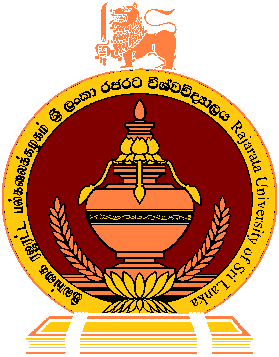Contribution to Undergraduate Program
Overview
The Community Medicine teaching programme extends over a period of four semesters (from the beginning of 4th to the end of 7th semester) during the third and fourth years of undergraduate training. The intended learning outcomes (ILOs) of the Community Medicine teaching programme are adopted from the main objectives of the undergraduate training programme of Faculty of Medicine and Allied Sciences, Rajarata University of Sri Lanka. The ILOs are also inline with the WHO Guidelines for teaching of Public Health at undergraduate level in Medical schools (2011).
Mission
To contribute to the development of a holistic medical professional, who will demonstrate knowledge and competence with compassion in dealing with primary health care, desire for lifelong learning, evidence-based practice, interdisciplinary teamwork, and professional and ethical behaviour in practice in order to improve and sustain the health of the population.
Goal
The overall goal of the Community Medicine teaching programme is to ensure that the medical graduate has acquired public health competencies needed to solve health problems of the community with emphasis on health promotion, disease prevention, cost-effective/evidence based interventions and follow up.
Intended learning outcomes
After completing the Community Medicine course, students will be able to,
1. Appraise health promotion, disease prevention and public health as major components of health and appraise the role of public health in providing individual healthcare.
2. Apply appropriate statistical techniques for presentation, analysis and interpretation of health data and critically appraise the statistical analysis in medical literature.
3. Identify the demographic changes in the community by accessing the demographic data sources and critically appraise the causal factors and implications of such changes pertaining to public health.
4. Describe the basic concepts of maternal and child health, promote maternal and child health through practical application of these concepts and critically appraise the current national family health programme of Sri Lanka.
5. Explain nutrition related problems in the community/individuals by conducting appropriate nutritional assessment methods and/or by interpreting secondary data to formulate appropriate strategies to address immediate, underlying and basic causative factors.
6. Describe the distribution and determinants of health related events in a community by using appropriate epidemiological measures, explain basic concepts of causation and critically appraise the epidemiological methods used in scientific literature.
7. Explain the epidemiology of common communicable diseases in the global and local context and apply the knowledge for the control and prevention of the communicable diseases in the community in parallel with the public health system.
8. Explain the epidemiology of common non communicable diseases in the global and local context and to apply the knowledge for the control and prevention of the noncommunicable diseases in the community by addressing the modifiable and nonmodifiable risk factors in the context of the national programme.
9. Apply the basic concepts in occupational health to promote health in working places andto prevent common hazard at work settings.
10. Recognize the environmental health issues at household and community levels and toformulate appropriate environmental friendly interventions.
11. Access and appraise scientific information, design and carry out simple epidemiologicalresearch by identifying gaps in scientific literature and present the findings of the researchin a scientific format.
12. Promote health of individuals and families focusing on priority health needs and healthrelated problems at individual/family level considering the given social, cultural, economic and demographic context.
Intellectual and practical skills to be developed (outcomes)
1. Inquiry and analysis
2. Critical and creative thinking
3. Written and oral communication
4. Quantitative literacy
5. Information literacy
6. Team work and problem solving
7. Ethical reasoning and action
8. Self-learning and learning through observations
Course Structure
The Community Medicine teaching programme has 11 modules.
Course Code Module
CMD 3111 Demography
CMD 3121 Introduction to Biostatistics
CMD 3212 Maternal & Child Health and Nutrition
CMD 3221 Basic Epidemiology
CMD 3234 Public Health in Practice-I (Family Study Programme)
CMD 4111 Applied Epidemiology and Communicable Diseases
CMD 4121 Non Communicable Disease Epidemiology
CMD 4145 Research in Medicine
CMD 4211 Occupational and Environmental Health
CMD 4224 Public Health in Practice-II (Clerkship Programme)
CMD 4232 Public Health in Practice-III


